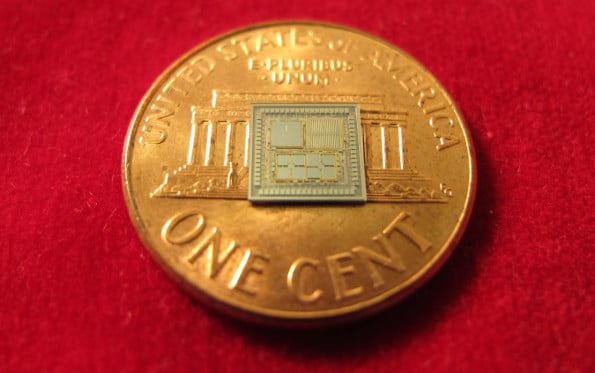DARPA Developing Navigation Chip That Doesn't Use GPS Technology
GPS is a powerful navigational tool that’s changed the way we travel, but it’s not without its shortcomings. The simple chip-to-satellite communication can be disrupted far too easily, for example, such as when a user goes through a tunnel or if there’s simple interference nearby. Being that GPS was originally developed for the military, those limitations are not just inconvenient, but life- or mission-threatening.
DARPA researchers at the University of Michigan have been developing a “timing & inertial measurement unit” (TIMU) that will augment GPS when needed to help a user navigate.
“Three pieces of information are needed to navigate between known points ‘A’ and ‘B’ with precision: orientation, acceleration and time,” reads a post from DARPA. “This new chip integrates state-of-the-art devices that can measure all three simultaneously.”

TIMU chip resting on a penny
The TIMU chip (which is still a prototype) is just 50 microns thick and contains a six-axis IMU consisting of three gyroscopes and three accelerometers as well as a master clock. All of the layers are made from silica, which the researchers believe to be an ideal substance for integrating all of layers into a single package by dint of its hardness and performance.
The TIMU chip is smaller than a U.S. penny and is designed to fit easily into products from handheld navigation devices to “small airborne platforms”.
DARPA researchers at the University of Michigan have been developing a “timing & inertial measurement unit” (TIMU) that will augment GPS when needed to help a user navigate.
“Three pieces of information are needed to navigate between known points ‘A’ and ‘B’ with precision: orientation, acceleration and time,” reads a post from DARPA. “This new chip integrates state-of-the-art devices that can measure all three simultaneously.”

TIMU chip resting on a penny
The TIMU chip (which is still a prototype) is just 50 microns thick and contains a six-axis IMU consisting of three gyroscopes and three accelerometers as well as a master clock. All of the layers are made from silica, which the researchers believe to be an ideal substance for integrating all of layers into a single package by dint of its hardness and performance.
The TIMU chip is smaller than a U.S. penny and is designed to fit easily into products from handheld navigation devices to “small airborne platforms”.

